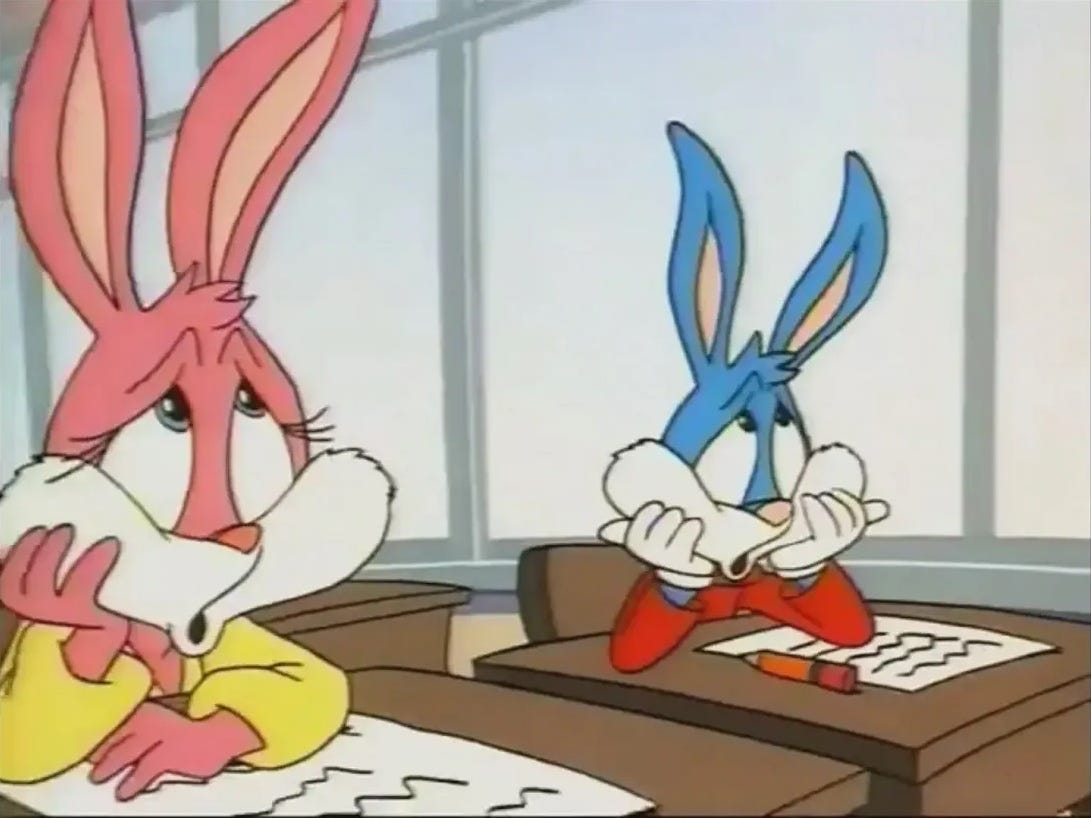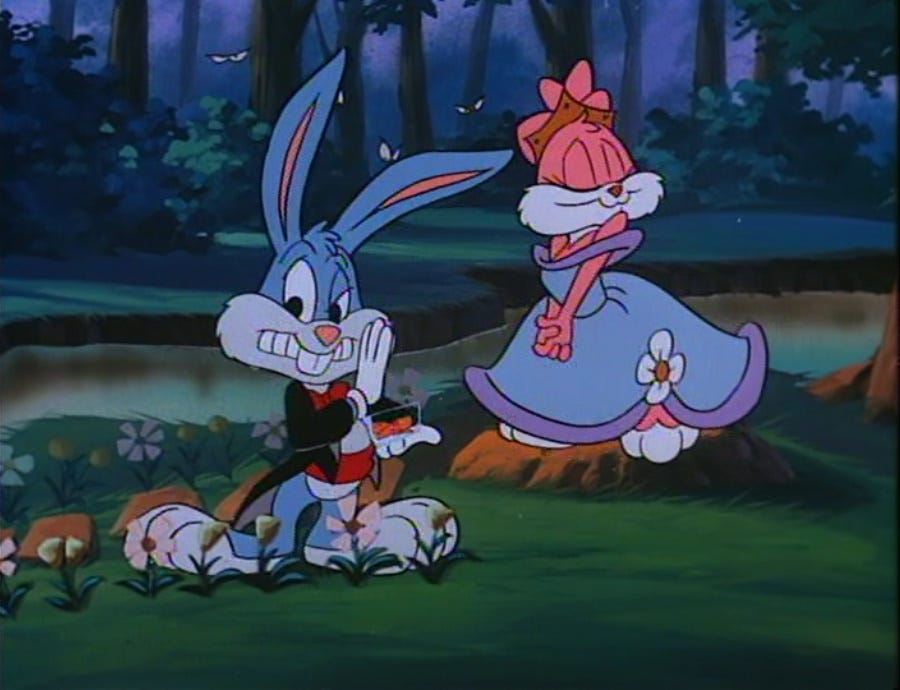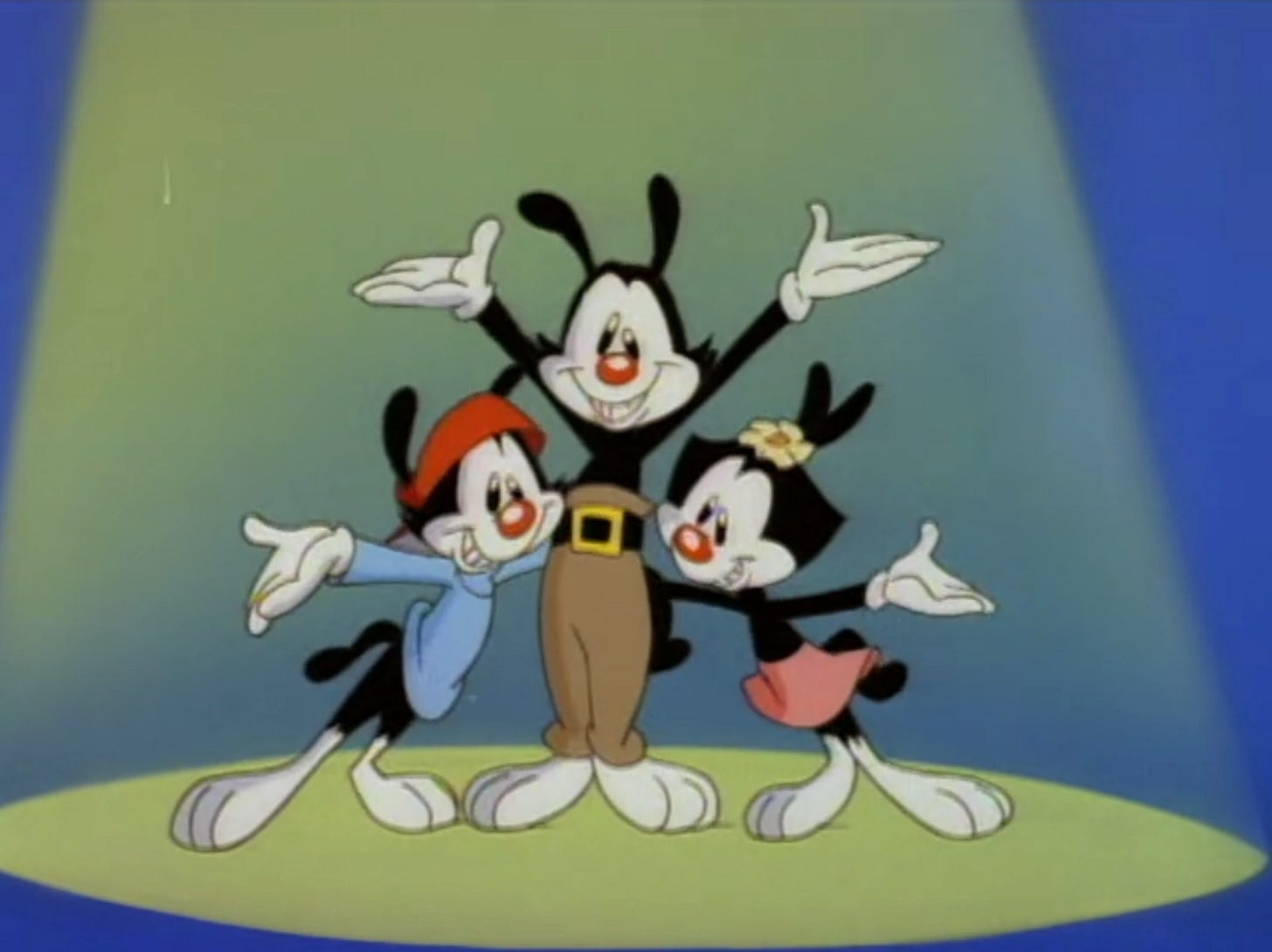A Bittersweet Ode to Tiny Toon Adventures
Revisiting How I Spent My Vacation and the stories we loved as children
Discussed: Tiny Toon Adventures, Tiny Toons Looniversity, Animaniacs, The Adventures of Pete & Pete, Sesame Street, The Critic, Dr. Katz Professional Therapist, The Simpsons, King of the Hill, All That, They Might Be Giants, Nickelodeon, reboots, nostalgia, growing up, animation, the ‘90s
Gabe: Well this was a nostalgia trip. I don’t think I’ve seen this since it came out, and only then as TV episodes, not as the home video release.
Arielle: Yes, for me as well! I don’t watch a lot of kids’ media in general so I wondered a lot about how the ethos of the series held up. I noticed a lot of the humor might go over a kid’s head!
G: I was thinking a lot about how to talk about this one, since it was made for kids, and it’s not likely anything kids are going to watch today.
A: It’s one of the reasons I checked out the reboot Tiny Toons Looniversity, which included some major changes that I think fit more with our current moment
G: No more “no relation” for Babs and Buster, since they’re twins now!
A: I was shocked by that one! Buster and Babs went to prom together. Their romantic relationship in the original show was kind of central to the plot.
G: Going in, I was curious how the older one would hold up, but after watching the first episode of Looniversity, I kept thinking about the changes. I was surprised how much romance, or at least hints of romance, there were in How I Spent My Summer Vacation. There’s the romantic tension with Buster and Babs, Fifi’s whole storyline is about a date with a movie star. Shirley is pestered for a date by Fowlmouth. And then one of Buster’s adventures in the South is a marriage story.
A: I noticed the movie was also rated TV-14, so I was curious who exactly the intended audience was.
G: Yeah, I don’t think I would’ve watched it when I was 14. But as a second grader, it seemed like a better-than-average cartoon.
A: I loved Tiny Toons. As a child, I felt like it was so exciting to have female reimaginings of classic TV stars. And I was a big Babs Bunny fan. She was so funny and had a really distinct personality from Buster. Her thing was impressions and they were kind of foils to one another, which I think you see in the film too. There was an old Hollywood screwball comedy feel to their romance!
G: Even as a kid, I wasn’t a huge Buster Bunny fan. I didn’t dislike him, but he seemed like much more of a Nineties Cool Guy type of character. Babs was a lot funnier, and reminded me more of Bugs with the gags and costumes. Buster had that insouciant attitude of Bugs, but I don’t think that works as well in the ensemble of Tiny Toons. With the old Hollywood humor to their relationship, I don’t think as a kid I understood what that dynamic was referencing, but it translates pretty well. I wonder how kids at the time thought about the other references in How I Spent My Vacation—the hotel room of different late night TV hosts, the Roseanne Barr joke, the Deliverance plot.
A: I think as a kid I felt very grown up watching Tiny Toons because I understood it had pop culture references, but I didn’t really get any of them. The Deliverance references actually shocked me!
G: The reboot almost exclusively references Looney Tunes. Were the references to outside pop culture in Tiny Toons something they put in for adults, or something kids might occasionally get, in the ‘90s when there was more of a monoculture? As a kid watching this, I’m sure I vaguely recognized who Letterman, Carson, Leno, Oprah, Roseanne, and a handful of others were from just being around TV. I might not have understood the jokes entirely, but they gave me a sense that there was this grown-up world of culture I’d eventually understand.
A: For some reason, when I think of Tiny Toons, I also think of a show whose primary audience was adults: The Critic. It was also very self-referential and pop culture savvy. And other animated shows I remember like Dr. Katz Professional Therapist. I think they do owe a debt to Tiny Toons. But perhaps that’s just because I was first exposed to Tiny Toons and it left such a big impression on me as a child?
G: That’s a good point. (I think Dr. Katz kind of presaged the comedian podcast boom, too). I remember really liking The Critic as a kid, too, and thinking of it in the same vein as Tiny Toons and Animaniacs, and The Simpsons and King of the Hill. I’ve rewatched The Critic, King of the Hill, and The Simpsons a lot, and I see now how those are definitely for adults. But revisiting Tiny Toons and Animaniacs, I get the sense that they’re made for kids, but they’re made by adults who take the jokes and ideas seriously.
A: Yes, I agree! Something that really strikes me in terms of time period is how much less fixated on a clear moral Tiny Toons and Animaniacs were. Like, what do we learn from Plucky’s adventures traveling to “Happy World Land” in the Tiny Toons movie? Or Buster and Babs’ adventure down the river? It’s zany and fun and that’s really the point, right? I can’t imagine a popular kids show today not having some sort of “lesson learned” by the end of the series. But, again, I don’t watch a lot of current children’s programming, so I’m not sure.
G: From the kids in my family, I gather that a lot of kids’ programming has shifted to YouTube, or at least that’s where kids are going to watch something aimed at them. That has me wondering who the Tiny Toons reboot is for. It’s much more wholesome than the original, based on what I’ve seen so far. It might be aimed at the Bluey audience of kids’ shows that are kind of fun for adults to see over and over. Bluey reminds me a lot of The Simpsons, but with a focus for kids.
A: Wholesome is the right word. But I wonder if it strikes the right chord with children. One of the things I really enjoyed about the original Tiny Toons was just how weird it was. I actually remember loving Sesame Street for the reason that some of the comedy skits were about how annoying certain characters like Grover were. I just loved when characters made mischief and could be silly for the sake of being silly.
G: What makes these shows for kids stand out now that I’m rewatching is that they share some of the same joke structures or cultural references as more grown up shows, but the perspective is clearly filtered through a lens for kids. Without stepping into a whole cultural danger zone, it does seem like that’s a distinction that’s harder to draw now, especially in some formats like animation or young adult novels.
A: Do you remember All That on Nickelodeon? Clearly for a slightly older audience than Tiny Toons but with a similar vibe of a “kid space” that was still interested in adult pop culture references.
G: I still think a lot about All That having a recurring Ross Perot bit. Nickelodeon in the ‘90s really captured that idea of shows for kids that were weird but felt current and not explicitly educational. They were well-done but still clearly meant for kids, from a kids’ perspective.
A: The not being explicitly educational is interesting to me, because while I loved educational shows too, I feel like these shows left a bigger imprint on my development. We talked about this before but I remember the Mister Tastee episode of The Adventures of Pete &Pete and how that was one of the shows that really made me think about empathy.
G: I love that episode! I think that’s a big value of shows in this lane—they don’t underline the message but they do introduce kids to ideas about the world they’re growing up into. That’s what I’m thinking with the kids’ perspective idea. Nickelodeon really cultivated this “no adults allowed” type of attitude in my mind. On Pete and Pete, the grown-ups were basically from another planet. And I wonder how much that really exists as a zone in media now. We’re at a time when it seems like adults are much more participatory in media meant for younger people—going back to the idea of Y.A. readers in their 20s and 30s. Of course everyone can read or watch whatever they want, but I think there’s an important difference in what you get from a show or book that’s good and meant for young people and a show or book that’s good and meant for adults. The former can frame the world in a way that helps young people prepare for it while the latter grapples with ideas in a way that’s more in line with adult experiences.
A: Yeah, this is so fascinating. I think when I was a child I enjoyed the “kids only” atmosphere of Nickelodeon, but I also felt the goal was to eventually enter the more sophisticated world of movies and TV shows where adults as the primary audience. Now I feel like it’s often the opposite, with adults wanting to embrace the culture of younger generations. I even wondered about this with my own response to the Tiny Toons reboot—why did it bother me that Buster and Babs were now siblings? It’s clearly a thirty-year reboot for a much younger audience. And yet, I did feel a sense of protectiveness towards the original characters. They matter to me because they mattered to me as a child.
G: Same. At first I was kind of dismissive of the changes, but just as you say, it’s for a different audience. With this, I think a lot about the band They Might Be Giants. Tiny Toons did two music videos for their songs in the ‘90s (it’s how I heard about the band) and that kind of branded them as a band for kids. But their songs deal with death and depression and some really heavy topics, albeit with upbeat new-wavey style instrumentation. Later, the band made kids’ albums. I heard an interview with one of the members, John Linnell, who said something to the effect of—they make music for adults by default, but when they make music for kids, they shift into this mode of making something kids will enjoy but adults will be fine overhearing a thousand times in the car. What I took from it was that there needs to be that consideration in kids’ media that adults are going to consume it passively. Where I think this sometimes goes awry is when there’s a kids’ program that has “something for the grown-ups” and it’s a joke that kids won’t get at all—like a break from the story to talk just to adults. Tiny Toons, and especially Animaniacs, balance that pretty well. A kid probably knew who Bill Clinton was, or they could laugh at a Jack Nicholson impression without knowing precisely who he was.
A: Yes, and I think both shows made kids feel respected rather than talked down to. I remember feeling like both shows were welcoming me into a culture that was a little larger than what was seen in shows that fixated on the experience of childhood.
G: Yeah, a grown-up show for kids rather than a kids show for grown-ups. On your point about feeling protective when you see the reboot. It makes me wonder: Why try to reboot Tiny Toons at all? The original was a way of updating the old Looney Tunes characters without just remaking the old cartoons. The new characters had a ‘90s energy. But if Warner Bros. wants people to engage with their library of old cartoons, why not try that level of remove again—make a 2020s version of the idea, rather than update the ‘90s version of the old idea? Sure, the original Tiny Toons was based on older cartoons, but the characters were new.
A: Our obsession with reboots can also come at the expense of new ideas. And I’m skeptical that a new version can always “correct” an old one. For example, it was nice to see more female characters included in Looniversity, but the idea that this “fixed” the old Tiny Toons struck me as a bit of a misunderstanding of how exciting it was to see female characters in the original version. Babs was already weird and funny, very feminine without being a “Disney Princess” character.
G: Definitely. And it makes me think Max is after the original Tiny Toons viewers with the reboot, hoping they’ll watch it with their kids. But that seems like it will be doubly disappointing. The adults will compare it to the original and find it lacking, while kids probably don’t have any affinity to Tiny Toons or even to the original Looney Tunes.
A: It will be interesting to see the cultural reception! And I’d love to chat further about Animaniacs in one of our next talks.
G: Same! Blasphemy for the Tiny Toons lovers out there, but I liked Animaniacs much, much more as a kid.
A: Great female characters there too, especially Dot!








